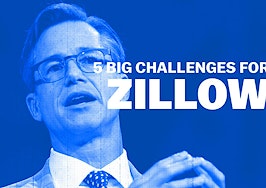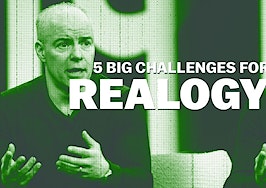Through December Inman will be digging into the real estate industry’s most prominent brokerages, iBuyers and paradigm-shifters to suss out the biggest challenges each face in 2022. Check back as we publish a new report on CoStar in the days ahead.
EXp Realty hasn’t had any trouble gaining attention in recent years.
The brokerage has seen massive, rapid growth in a relatively short period of time, which has helped it attract a lot of eyeballs in the industry. Between 2018 and 2020, the company’s agent count increased by 151 percent, and its transactions increased by 220 percent, according to an April 2021 analysis by strategic advisor and global real estate tech expert Mike DelPrete.
“Since 2018, Compass and eXp have grown agent count and transaction volume exponentially, which — at this scale — is unheard of and why each company is so disruptive in the industry,” DelPrete wrote in the post, which focused on Compass, Redfin and eXp’s innovative models.
As of the third quarter of 2021, eXp hit its sixth straight record-breaking quarter, with a 97 percent annual increase in revenue to $1.1 billion, a 60 percent annual increase in net income to $23.8 million, and an 82 percent increase in agent and broker count to 65,269.
There’s no doubt that eXp has been on an extended hot streak, but that doesn’t mean the brokerage lacks key challenges to consider as it looks to the new year. Among those challenges will be continuing to scale all the company’s operations appropriately as it keeps up its rapid growth trajectory, as well as finding new ways to stand out as an innovator as others in the industry start to catch up to it.
Here’s what else experts told Inman the brokerage will face in 2022.
Finding new ways to innovate
EXp has led the industry, basically since its inception, in innovation and thinking outside the box.
It was a virtual brokerage that met in a cloud-based campus long before working remotely and social distancing were commonplace. Its unique agent compensation model, which rewards agents with company stock who hit transaction benchmarks and recruit other agents, is also a huge attraction that originally made it stand apart from competitors.
But other brokerages are starting to find ways to join eXp’s once-exclusive club. Compass, for instance, which came on the real estate scene about three years after eXp, has been hard on eXp’s heels in terms of both growth and offering a competitive stock agent compensation model. That means that the company will want to explore new ways of offering a clearly unique value proposition, as others in the industry catch up.

Steve Murray | Real Trends Consulting
“All kinds of brokers, whether it’s local brokerages or national companies — all of them over the last 12-15 months have put in place new things to counteract the competitive threat of eXp,” Steve Murray, president of Real Trends Consulting, told Inman. “And those efforts are still underway.”
From new compensation models to remote working capabilities and better tech platforms, Murray said other brokerages are becoming more competitive with eXp, and it may not be long before eXp agents decide they want to try something new.
“They’ve been with eXp one, two, three, four, five years and now they see something else — there’s another offer that wasn’t there before, whether it’s from a Keller Williams or a HomeSmart or United Real Estate or Realty One Group, to name a few in that segment of lower cost brokerages — when their competition catches up to them,” Murray said. “And there are other companies that have some similar economic appeal.”
When Inman spoke with Glenn Sanford, eXp Realty founder and eXp World Holdings, Inc. CEO, he agreed that innovation would be top-of-mind for the company going into 2022.
“There’s going to be more competition because we’ve got more innovative brokerages that are starting to show up,” Sanford said. “Before, I think that we felt like we didn’t really have much in the way of competition because we had such a new model. Now, we’re starting to see more and more new models show up, so I think the challenges for us will just be recognizing where we need to pivot, how do we need to innovate, who do we need to add to the team, in order to keep our value prop as strong as it’s been historically.”
Sanford couldn’t go into details on what some of those innovations might include, but he did say that transactions via cryptocurrency, making inroads in the second-home and fractional homeownership markets, as well as continuing to expand into iBuying, are all things the company is thinking about.
Scaling effectively as quickly as they grow
“EXp had huge, rapid growth,” Jeff Lobb, founder and CEO of SparkTank Media, told Inman. “When you have that much growth, you have to be sure you’re still prepared to handle the level of services when you have that much scale and onboarding.”
With Zillow’s recent gaffe of moving too big too fast on the iBuying front still fresh in many minds, eXp will want to ensure they don’t make a similar mistake that could draw the industry’s scrutiny.
Lobb added that making sure individual agents transitioning to the brokerage are set up with the support systems they need will play a big role in positioning eXp for continued successful growth. The brokerage has made a splash by recruiting a number of teams from other brokerages recently, but Lobb said that recent focus on teams could inadvertently be leaving single agents by the wayside.

Jeff Lobb | Sparktank Media
“While teams have been very successful in transitioning [to eXp] — and it’s probably not a secret — the ones that struggle are the solo agents,” Lobb said. “If they’re not truly independently sufficient in their business, they may struggle without being part of a team.”
He clarified that agents do certainly have support from eXp World, the company’s virtual, cloud-based campus, but that without the brick and mortar of an office where an agent can get face-to-face support for their individual transition, they may struggle a bit more than others.
“Finding a support team for them, making the introductions if they needed that support, would probably be a smart thing to do,” Lobb said. “To be honest, maybe [eXp does] that anyway and I just don’t know that, but you see successes and failures all the time — the only ones I’ve seen struggling are the solo agents.”
Facing the stock market’s ups and downs
Ongoing changes with the pandemic have left the stock market a bit “schizophrenic,” as Murray put it to Inman.
For publicly traded real estate companies like eXp, of course, it’s been a bit of an emotional ride over the last two years, especially since one of the brokerage’s primary value propositions is being able to offer stock shares to agents as an incentive for their work.
The company’s stock surged in early 2021, but today, it’s mellowed out quite a bit. Specifically, as of late December 2021, eXp World Holdings’ 52-week stock price high was $90, but its price when Inman checked on December 22 was hovering around $35.50.
That kind of volatility, Murray said, might make agents question how much of a deal they’re actually getting through company shares.
“How many people over the last say, six to eight months, got share options at $30, $40, $50, $60, $70 a piece that are underwater?” Murray said. “How long does it take for agents to understand that their shares are not worth a lot right now?
“I don’t think it’s a huge thing, but it’s something [eXp is] going to have to deal with.”
Meeting the goal of 500,000 agents in five years
One of eXp’s self-established challenges that it’s gradually making progress towards is obtaining 500,000 agents within five years, or by the end of 2026.
During EXPCON, a companywide gathering that took place in Las Vegas in November, Sanford announced the goal, asserting, “This is not that much of a stretch goal.”

Glenn Sanford | eXp Realty
When Inman spoke with Sanford more recently, he likewise said that at the brokerage’s current growth trajectory, the goal was very feasible. He said the company had just surpassed 70,000 agents, and that if it continues to grow by at least 50 percent year over year (which, he noted, the company is currently ahead of that growth rate by about 20 percent), that would bring them to over 100,000 agents by the end of 2022, and to about 160,000 agents by the end of 2023.
“If we just do the math, then by 2024, [there’s] potential that we would have the largest single real estate brand worldwide by agent count,” Sanford said. “So that’s just using 50 percent. If we grow something more akin to where we have been growing, we could be there potentially by the end of 2023. So, pretty ambitious growth goals, but I think they’re definitely reasonable just in terms of thinking about where we’re growing to.”
Transitioning to the metaverse
EXp is arguably the brokerage best positioned to enter the metaverse once it goes mainstream, having about 12 years of experience operating in a virtual world.
Therefore, entering the metaverse won’t necessarily be a “challenge” for the brokerage in the traditional sense of the word, but it will be pretty interesting to see how eXp adapts its existing virtual world in response to the metaverse, or, how other brokerages potentially use what eXp has already done as a model for themselves.
“The interesting chatter now lately is with the metaverse that’s being talked about that’s potentially only three to four years away,” Lobb said. “[It’s an] interesting positioning because basically it’s given someone like eXp a 10-12 year jump into a similar world they’ve already created that’s very similar to what the metaverse might be.
“What used to be so futuristically spoken about, like a virtual world, which seemed so far out of reach, now it may become part of our mainstream business world,” he added. “Will we see others create some kind of virtual world to do business in with all these other brands? Because if the metaverse happens, business will start to happen there. The question is, will real estate brands follow the eXp model and create something similar?”
Sanford told Inman that as Omicron and other future variants of COVID-19 continue to cause disruption in the world at large and within the real estate industry, eXp is positioned to solve some of the challenges that arise as a result, because of its virtual infrastructure that’s prepared it for what’s to come with the metaverse. (Sanford told Inman in a previous conversation that the company has had conversations with Facebook about the metaverse.)
“I don’t know if any technology will solve for meeting in real life, but it will bring us a lot closer and certainly we’ll be able to enjoy the benefits of working remotely,” Sanford said. “There’s certainly, corporately, way more benefits to running a remote organization than running a bricks and mortar organization. I think for agents, that tradeoff is not as obvious, and I think that’s where it will be interesting to see how COVID continues to push agents that may want to be in a physical office out into the field and figure out other ways to connect with their fellow agents and brokers.”









